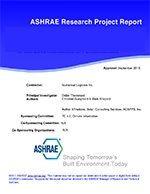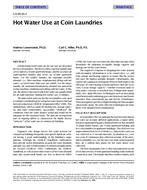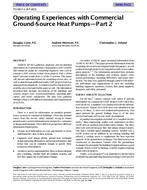The chilled water systems have significant power consumption for HVAC systems in commercial buildings. The systems mainly consists three components: air handling unit, cooling tower and chillers. Chillers are the essential components, and their operation consumes considerable power consumption. Due to the significant power consumption of such system, improvement of its efficiency would lead to significant benefit in energy saving. As the system characteristics and operational conditions can vary dramatically in practice, model-free self-optimizing control is of high interest in practice. In this study, the chilled-water plant being studied consists of one screw chiller and one counter-flow cooling tower. A multi-variable Newton-based extremum seeking control (ESC) scheme is applied to maximize the power efficiency in real time with the cooling load being satisfied. The feedback for the ESC controller is the total power of the chiller compressor, the cooling tower fan and the condenser water pump, while the inputs are cooling-tower fan speed and the condenser-loop water flow rate. The two-input Newton-based ESC controller is simulated with a Modelica based dynamic simulation model of the chiller-tower system. Two inner-loop PI controllers are used to regulate the temperatures of evaporator superheat and consender leaving water at their respective setpoints. The effectiveness of the proposed control strategy is validated with a simulation case with power consumption of chilled water plant reduced from 433.58 HP (323.32 kW) to 370.75 HP (276.47 kW) under tested conditions. The energy efficiency increase is 14.5%. More simulations are performed to investigate the transient and steady state performance of proposed control strategy using integral performance indices.
Citation: ASHRAE Papers: 2015 ASHRAE Annual Conference, Chicago, IL
Product Details
- Published:
- 2015
- Number of Pages:
- 8
- File Size:
- 1 file , 2.5 MB
- Product Code(s):
- D-CH-15-C014


